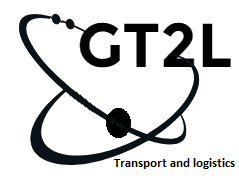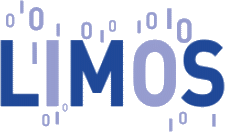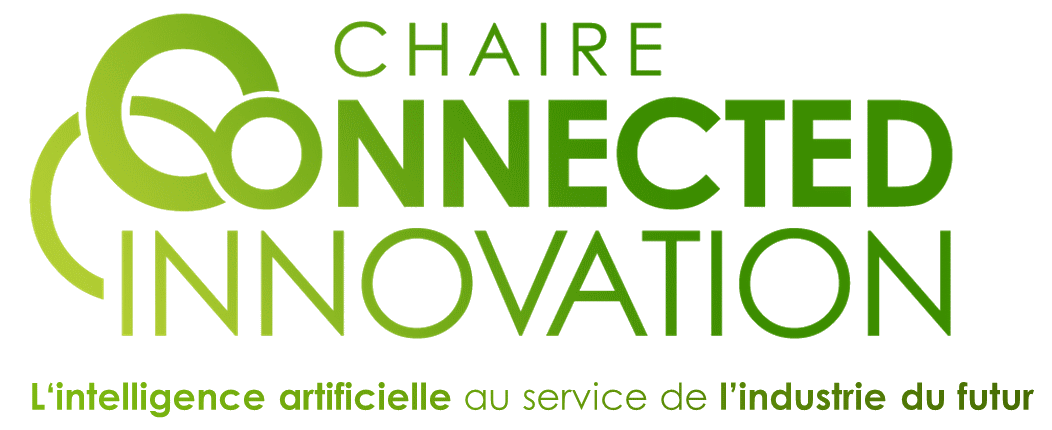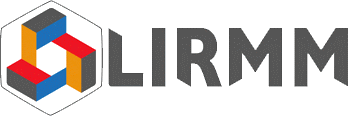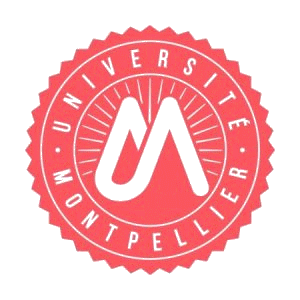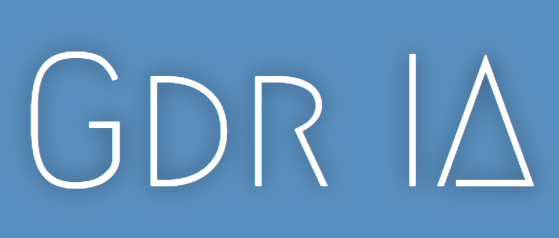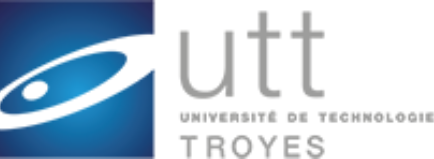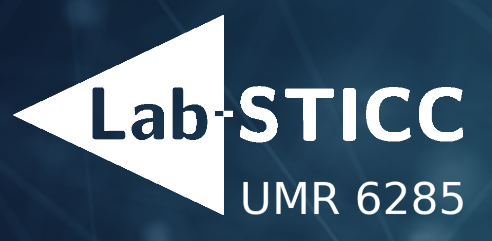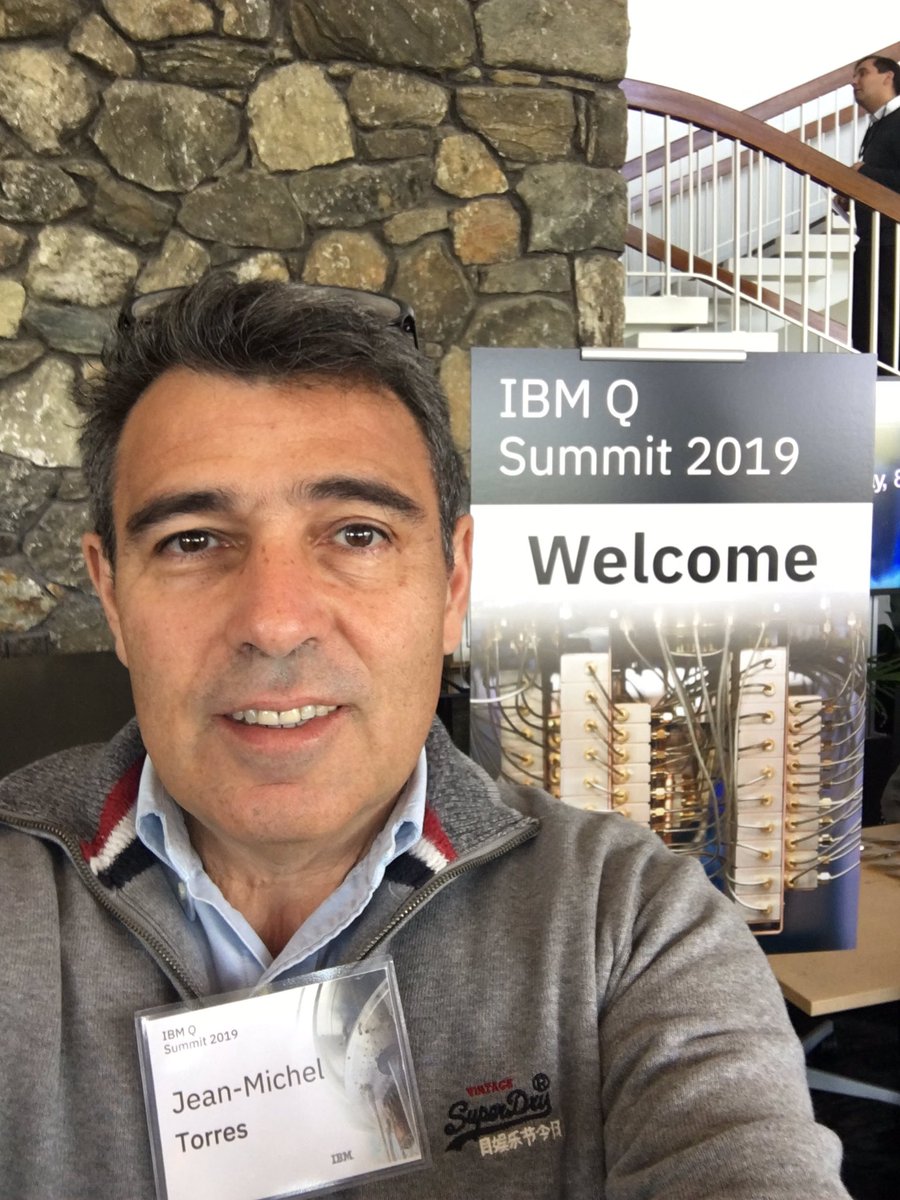-
-
Ecouter une présentation de l'évènement par Olivier Ezratty le blog
-
The coordination of the event is under the supervision of both EUME/GT2L for the conference and EUME/GT ROQ for the school which organized together an international joint event composed of three items:
• EUME conference sessions focusing on the last advances on metaheuristic;
For more than 2 decades, the annual European Congress on Metaheuristics (EU/Meeting) has been held in a European city. The objective is to bring together specialists in the field of optimization, and allow them to present their latest advances in terms of metaheuristic type resolution methods as well as to give tutorials on specific subjects.
For its 21st edition, EU/MEeting will take place within the University of Technology of Troyes. The theme will focus on recent advances in metaheuristic including methods based on new paradigms brought by quantum computing
The EUME conference includes two plenary talks of both Eric Taillard and Jin Kao Hao.
• tutorials on metaheuristics and quantum computing;
• a school (including practices) on quantum optimization;
The school has a specific focus on quantum "metaheuristics" including but not limited to QAOA and adiabatic optimization.
The school is dedicated to researchers and PhD students who are interested in discovering the quantum theory with application to very concrete problems including for example graph coloring, SAT and/or TSP.
Key-points:
• The school enclosed in introduction to configure programming environments, and make in short time the first quantum program. Jean-Michel Torres (IBM) will be in charge of the introduction the IBM Qiskit solution, Rober Wang and Anne-Lise Guilmin charge are in charge of the introducion on the QLM Solution and Wesley Coelho in charge of the introduction of the PASQAL solution. • The school enclosed in introduction to the QML environement; • The examples are linked to classical well-know operational problems.
The organizers of this event will issue a certificate of participation for the doctoral schools
The event is organized by: • Marc Sevaux (UBS) • Caroline Prodhon (UTT) • Eric Bourreau (LIRMM) • Philippe Lacomme (LIMOS) • Sonia Vanier (LIX) • Frédéric Saubion (LERIA)
-
- EURO (The Association of European Operational Research Societies)
- Terraquantum
- Genci
- Labsticc
- UCA
- Atos/Eviden
- GDR IM (Groupement de Recherche en Informatique Mathématique)
- GDR RO (Groupement de Recherche en Recherche Operationnelle)
- GDR IA (Groupement de Recherche Aspects Formels et Algorithmiques de l'Intelligence Artificielle)
- SAGIP (Société d'Automatique de Génie Industriel et de Productique)
- LIMOS (Laboratoire d'Informatique de Clermont-Ferrand)
- GT META Meta Heuristique
- GT ROSA RO et Santé
- EU/ME (EURO Working Group on Metaheuristics)
- GT2L (Working group of the GDR RO)
- GT IQ (Working group of the GDR IM)
- Chaire Connected Innovation
-
UTT (Université de Technologie de Troyes)
- LIRMM (Laboratoire d'Informatique de Montpellier)
- LIST3N (Computer Science and Digital Society - UTT)
- EURO (The Association of European Operational Research Societies)
-
-
• Caroline Prodhon
UTT
-
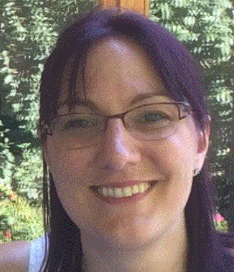
- Caroline Prodhon is in charge of the local organization and welcomes us to Troyes for this school where she takes care of the logistics of the event.
Thank you for the management of the rooms, the management of the registrations, the follow-up of the budget, the search for sponsors... and the resolution of the 1001 small daily problems
-
-
• Neil Abroug
Head of the French National Quantum Strategy
-
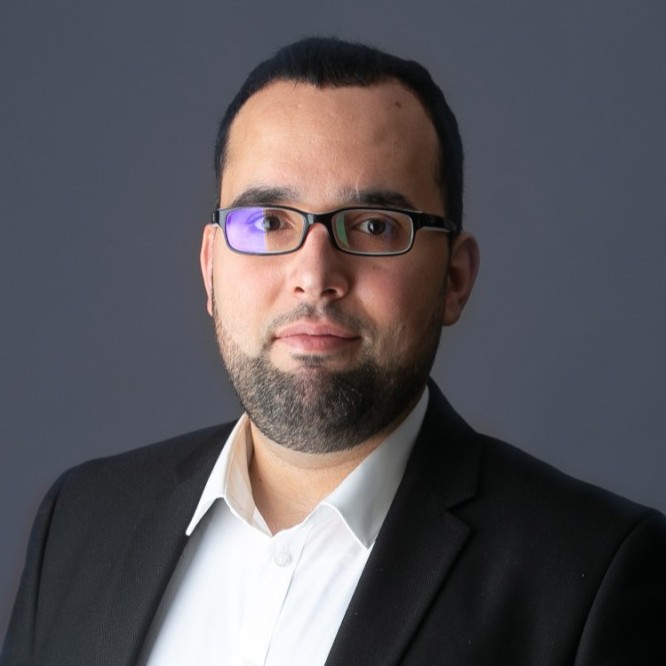
- Neil Abroug coordinates the French national quantum strategy having a 1.8 Billion EUR investment portfolio. He began his career as a research engineer and project manager at CEA in the field of Industry 4.0. In 2018, he joined the Directorate General for Enterprises at the French Ministry of Economic Affairs where he contributed to setting up the national quantum agenda. In particular, he was the rapporteur of the parliamentary report “Quantum: the technological shift that France will not miss”. Neil is a Dr. Engineer in applied mathematics. He also graduated in Innovation Management and Competitive Intelligence.
His linkeding page : here
-
• Prof. Dr. Anita Schöbel
president of the EURO (Association of European Operational Research Societies)
-
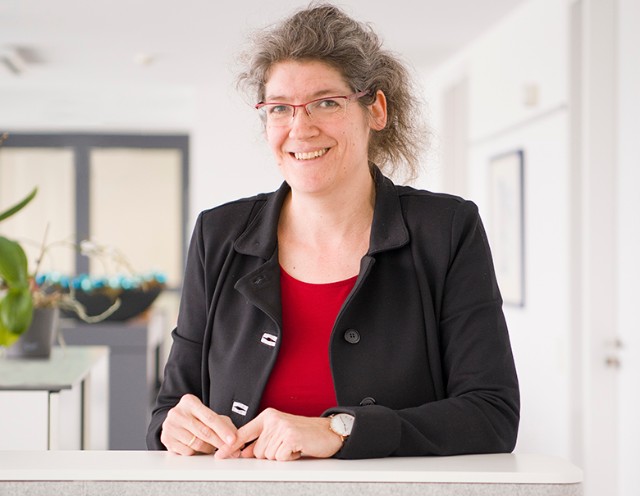
- Anita Schöbel is professor for Applied Mathematics at the Technical University of
Kaiserslautern and director of the Fraunhofer Institute for Industrial Mathematics ITWM
with more than 450 employees.
At Fraunhofer Society, she is responsible for the strategic research area Next
Generation Computing and vice spokesperson for the quantum computing competence network.
In 2019 and 2020 she has been president of the German Operations Research Society (GOR).
Currently she is president-elect of EURO (Association of European Operational
Research Societies) and will be president of EURO in 2023 and 2024.
A short bio in English : here
-
• Olivier Ezratty
Consultant and author
-
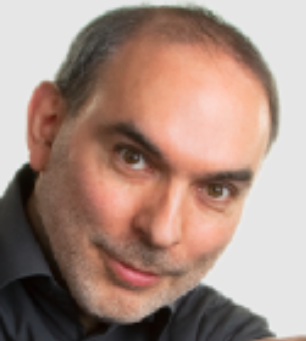
- Olivier Ezratty is a consultant and author on quantum technologies working with businesses and public services. He is the author of the open-source book “Understanding Quantum Technologies 2022”, 5th edition, the coordinator of the quantum elective at EPITA, trainer at CapGemini and CEA INSTN and an independent expert for the French government as part of the France 2030 plans as well as for Bpifrance. He is also a cofounder of the “Quantum Energy Initiative” in 2022 along with Alexia Auffèves (CNRS MajuLab Singapore) and Robert Whitney (CNRS LPMMC in Grenoble). Originally, Olivier Ezratty started as a software engineer in electronic publishing at Sogitec and then run various marketing operations at Microsoft in France including being their CMO and in charge of developer relations. He is a freelance consultant since 2005.
A short bio in English : here
- Description:
- The speech will start with casting the origins and history of quantum computers as a branch of the “second quantum revolution”. What are their present and future computing capabilities? The different quantum computing paradigms (gate-based, annealing, simulation). Their related algorithms classes, use cases and development tools. What are the origins of the so-called quantum computing acceleration? The role of hybrid quantum computing. How are quantum computers architectured and who are the main vendors in that space? What are the scientific and technical challenges to deliver the promise of exponential computing capacities? How is the quantum ecosystem looking like, from hardware to software? What’s the role of Europe in that game, squeezed between the USA and China?
-
• Simon Perdrix
LORIA
-
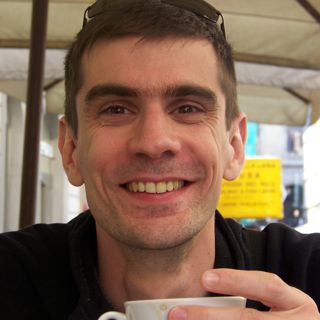
- Simon Perdrix is in charge of the working group GT IQ. He is a well-known researcher of the quantum community. He will introduce the quantum gates and circuit during an introduction at this event.
List of publications here
- Description:
- The course introduces the notions of qubits and quantum gates which make it possible to define a quantum circuit. A quantum circuit is the quantum counterpart of "usual" algorithms and they can then be implemented with different libraries (Qiskit, QLM...). Introduction to quantum circuits that allow manipulation of a probability distribution. The course introduces the fundamental theoretical results and presents the algorithm of Bernstein Vazirani and that of Deutch-Josza.
-
• Christan Artigues - Harold Ollivier - Sébastien Tanzilli
Head of several scientific organizations
-
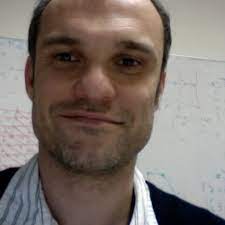
- Christian Artigues is at the head of the GDR RO
and has promote the creation of the GT ROQ to investage how quantum approaches could push OR researchers in definition new resolution way.
List of publications here
Due to last time personal constraint ... the GDR RO will be introduced by Marc Sevaux.
-
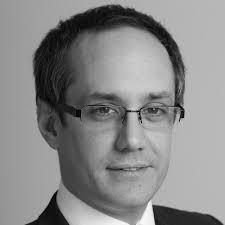
- Harold Ollivier is at the head of the QuantumTech Program launched by INRIA in 2021 and his research focuses is on building tools and methods for designing more robust applications for quantum computers. He has a strong quantum expertise cumulated over more than 20 years of research and across 5 teams and now he is involved in several projects in France and in Europe.
List of publications here
-
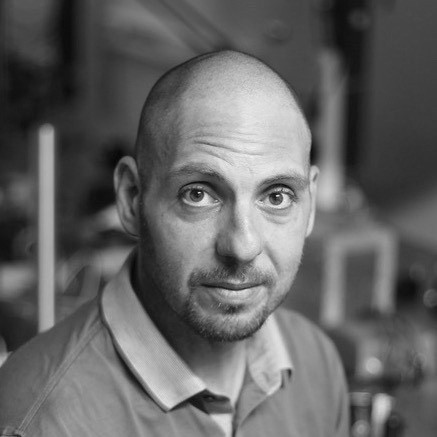
- Sébastien Tanzilli is Deputy Scientific Director et CNRS Institute of Physics (INP) in charge of Quantum Physics and Quantum Technologies.
List of publications here
- Description:
- Harold, Christian and Sébastien will give
us a global vision of the challenges of research and specific focus on quantum
including information about the different supports and perspectives in the research programs.
-
• Vedran Dunjko
Universiteit Leiden
-

- Vedran Dunjko’s research interest lies in the intersection of computer science and quantum physics, including quantum computing and quantum cryptography. Over the course of the last few years, he has been focusing on the interplay between quantum computing, machine learning, and artificial intelligence.
List of publications here
- Description :
- Description coming soon.
-
• Jin-Kao Hao
Angers
-
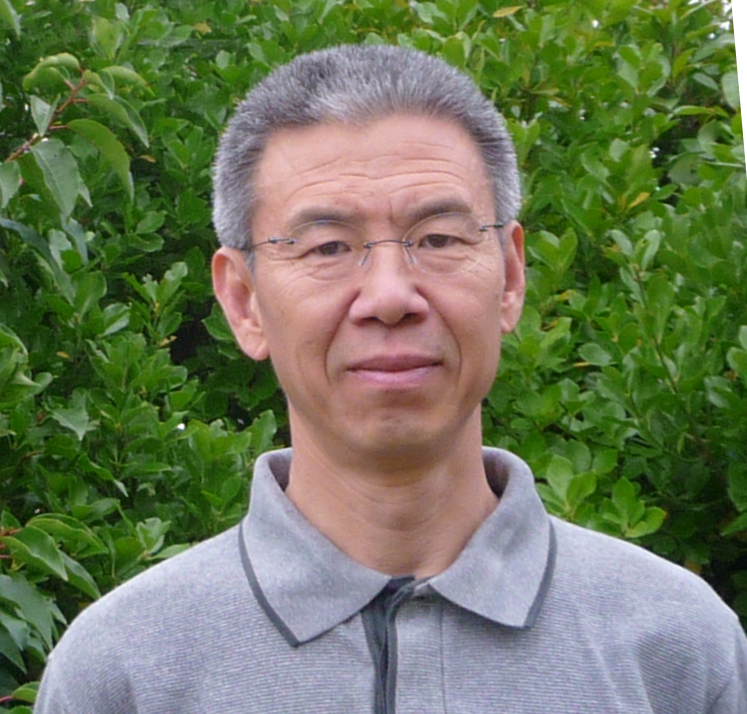
- Jin-Kao Hao is a Full Professor (Computer Science) at University of Angers. His workd is about search algorithms and methods for solving large-scale complex combinatorial problems. He is especially interested in metaheuristics and hybrid approaches combined with machine learning and data mining techniques.
List of publications here
- Description :
- The Unconstrained Binary Quadratic Optimization problem (UBQP) problem is a general model that is notable for embracing a large range of applications, including those from financial analysis, machine scheduling, computer aided design and cellular radio channel allocation. Moreover, a number of classical combinational optimization problems can be transformed into UBQP, such as graph coloring, MaxCut, set packing, etc. In this talk, we present some recent advances in metaheuristic algorithms for solving this well-known NP-hard problems, including local search algorithms (Tabu search…) and population-based algorithms (memetic search, path-relinking…).
.
-
• Eric Taillard
HEIG-VD
-
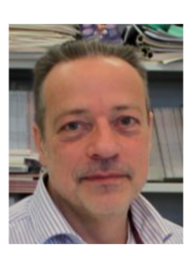
- Éric Taillard conducts research in the field of metaheuristics for over 30 years. After his studies and a PhD at the Swiss Federal Institute of Technology at Lausanne, he worked as researcher at the Inter-university Research Centre of Enterprise Networks, Logistics and Transportation at Montreal and then at the Dalle Molle Institute for Artificial Intelligence at Lugano. Since 1999, he is professor at the University of Applied Sciences of Western Switzerland, HEIG-VD campus at Yverdon-les-Bains. .
List of publications Here
- Description :
- Metaheuristics have become indispensable when trying to solve difficult problems of relatively large size. This talk will review the basic components of metaheuristics --- solution construction, solution improvement, randomization and learning. A component that is sometimes overlooked is the decomposition of a problem and the optimization of smaller parts. We will show how to proceed for various problems, including the traveling salesman.
-
• Olivier Hess
Atos/Eviden
-
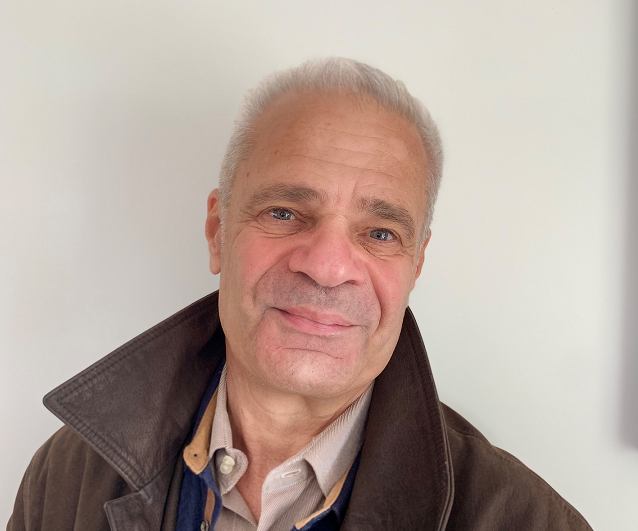
- In October 2021 Olivier joined Atos as Quantum Computing Leader and focal point for France. He is in charge of :
1. Defining Atos solutions for Quantum Computing and use cases to address the French market.
2. Coordinating strategic partnerships and collaborations in France including Research, Academic and Industrial ecosystems.
3. Coordinating actions within the framework of the quantum plan in France .
Extra information : Here
- Description :
- The social event organized by the connected chaire innovation will include a presentation of Olivier Hess (Atos/Eviden) about the technologies provided by Atos/Eviden in the field of Quantum Computing.
-
• Christophe Couteau
UTT
-
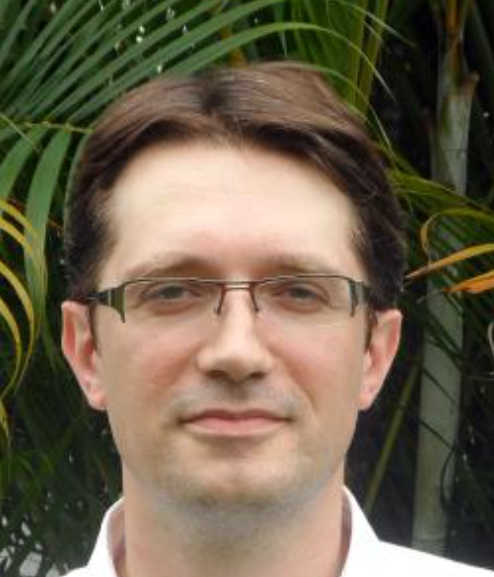
- Christophe Couteau is an associate professor at the Laboratory Light, nanomaterials & nanotechnologies - L2n University of Technologie of Troyes (UTT). From 2019, he is the director of the Laboratory Light, nanomaterials & nanotechnologies - L2n, .
List of publications : Here
- Description :
- In this talk, I will address the different technologies existing currently to make a physical quantum computer. The objective is to see in practise how current quantum computers are made. I will describe the physical principles of some of the sytems with a focus on photon and superconducting qubits. Perspectives, hurdles and potential solutions will also be mentioned.
Christphe Couteau présente l'intrication quantique :
-
• Jean-Michel Torres
IBM
-
- Jean-Michel Torres is member of the IBM staff from 1989. He regularly participates in training actions with students and companies to promote quantum computing. You can find one of his formations at the academy of Versailles
- Description :
- During the school he will speak to present IBM's Qiskit solution which he will apply to implement Grover's algorithm to solve a 3-SAT problem and on a Coloring and MaxCut problem..
In preparation for the course, you can consult the site on Qiskit and install the environment in Python by following the instructions that are here
-
• Wesley COELHO
PASQAL
-
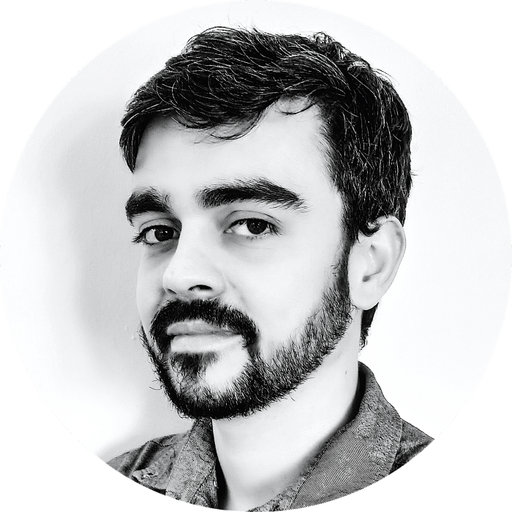
- Wesley Coelho holds a Master’s degree in Models and Algorithms for Decision Support and a Ph.D. degree in Computer Science with an emphasis on Operations Research (Applied Mathematics). He currently works as a Quantum Applications Engineer at PASQAL, where he develops innovative algorithms to extend the field of applications of PASQAL’s Quantum Computers. His interests are mainly on Quantum Optimization and related applications.
- Description :
- During the school, he will talk about Analog Quantum Computing while presenting PASQAL technology. He will also propose workshops where participants will be able to use PASQAL solutions to solve optimization problems.
-
• Fred Glover
Colorado University
-
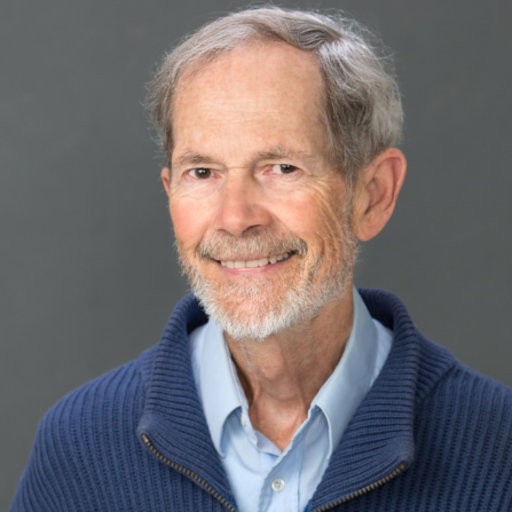
- Fred Glover is known for his strongly high number of publications on metaheuristics including the tabu method and evolutionary methodes. Currtenly Fred Glover is a Distinguished Professor, Emeritus, at the University of Colorado, and his researches encompass now quantum computing for which he published several paper at the crossroad of optimization and quantum.
List of publications : Here
- Description :
- coming soon
-
• Margarita Veshchezerova
TerraQuantum
-
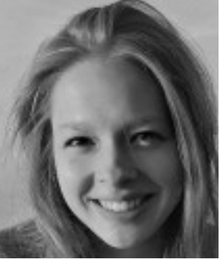
- Margarita Veshchezerova defended a PhD in quantum algorithms in December 2022. Since then, she became senior researcher in optimization in Terra Quantum. Her research interests lie in the field of hybrid quantum-classical approaches for combinatorial optimization.
- Description :
- Coming soon
PhD defense of Margarita : here
-
• Genci
High performance computing at the service of knowledge
-

- In charge of providing high-performance computing and massive data processing resources, GENCI's mission, at the national and European levels, is to promote the use of high performance
computing associated with Artificial Intelligence for the benefit of academic and industrial research communities.
- Description :
- GENCI is a very large research infrastructure (IR*). Created in 2007 to democratise the use of digital simulation through high-performance computing combined with the use of artificial intelligence and quantum computing, GENCI supports French scientific and industrial competitiveness.
GENCI fulfills three missions :
to implement the national strategy for equipping French scientific research with high-performance computing and massive data processing/storage resources in conjunction with the three national computing centres of its Associates
to participate in and proactively support the creation of an integrated ecosystem of high-performance computing associated with artificial intelligence on a European scale;
to promote digital simulation through high performance computing in open academic and industrial research
GENCI is a civil company owned 49% by the State represented by the Ministry of Higher Education and Research, 20% by the CEA, 20% by the CNRS, 10% by the Universities represented by France Universites and 1% by Inria.
The plenary session of Genci during at monday will be done by Philippe Segers, M.Sc. Executive MBA. He is a 25+ years in Program Management of R&D, with a background in Atmospheric Science, Numerical Modeling & Data assimilation and now he is workinga at GENCI and he is at the Head of European HPC projects and he has the PRACE Board of Director.
-
Participation is subjected to the payment of a participation fees of €180
The first 30 registered PhD students will have a promotional registration at 60€
All participants and theoritical and practical session organizers must pay the fees. The only exceptions are for the Invited Speakers ( Prof. Dr. Anita Schöbel, Ch. Couteau, Ch. Artigues, Olivier Ezratty, Simon Perdrix, Jin-Kao Hao, Eric Taillard).
The 180€ are required to take in charge the coffee break, the lunches and the extra charges.
how to participate ?
• You can submit a paper or not • You can be at the conference to present your paper or just to listen the presentations • You can be at the school even if you do not present a paper
In all cases, make your registration early
how to registrer ?
• STEP 1. CLOSED.
Warning : the number of places being limited, we advise you to pre-register as soon as possible
• STEP 2. Please download the registration form and return the form to emergingoptimization@gmail.com :
Version word Version pdf • STEP 3.Payment of the registration fees must be achieved by bank transfer :
warning : in the subject of the bank transfer, please specify the subject Quantum_Joint_Event_ and the name of the person concerned by the registration.
Bank account where to make the payment The registration of €180 gives a full access to classes and practices, and include the coffee breaks and the lunch for the 5 days of the event. A special meeting will be organized an evening during the week and it is also included in the fees.
Certificates of attendance will be issued and may be used by PhD studends to request validation of courses in doctoral schools.
Pour les membres des universités Françaises : pas de paiement par bon de commande
-
As extend abstract in pdf format of 4 pages must be sumitted to publication by email emergingoptimization@gmail.com with a subject entitled "Paper submission" and a copy must be adressed to the chairman.
Please use the following word template
Due date for submission :February 15th, 2023extended to 5th march .
If you are interested to organize a session contact us by email emergingoptimization@gmail.com with a subject entitled "session submission"
-
-
• Monday 17 April : Opening event and sessions
- 13h00-13h30 :
- Registration and coffee break at Hall M
- 13h30-13h45 :
- Introductory speech of Farouk Yalaoui (head of the research at UTT) - Amphi C001
- 13h45-14h00 :
- Introductory speech by Marc Sevaux who has been at the head of EU/ME - Amphi C001
- 14h00-14h15 :
- EURO Perspective by Anita Schöbel - Amphi C001
- 14h15-14h30 :
- Introductory speech by C. Prodhon on behalf of the organizers - Amphi C001
- 14h30-16h00 :
- Plenary session of Eric Taillard - Amphi C001
- :
- Metaheuristics have become indispensable when trying to solve difficult problems of relatively large size. This talk will review the basic components of metaheuristics --- solution construction, solution improvement, randomization and learning. A component that is sometimes overlooked is the decomposition of a problem and the optimization of smaller parts. We will show how to proceed for various problems, including the traveling salesman.
- 16h00-16h30 :
- Coffee break - Hall M
- 16h30-17h15 :
- Plenary session of Philippe Segers, M.Sc. Executive MBA for Genci - Amphi C001
- :
- GENCI is a very large research infrastructure (IR*). Created in 2007 to
democratise the use of digital simulation through high-performance computing combined with the use of artificial intelligence and quantum computing, GENCI supports French scientific and industrial competitiveness. GENCI fulfills three missions : to implement the national strategy for equipping French scientific research with high-performance computing and massive data processing/storage resources in conjunction with the three national computing centres of its Associates to participate in and proactively support the creation of an integrated ecosystem of high-performance computing associated with artificial intelligence on a European scale; to promote digital simulation through high performance computing in open academic and industrial research GENCI is a civil company owned 49% by the State represented
by the Ministry of Higher Education and Research, 20% by the CEA, 20% by the CNRS, 10% by the Universities represented by France Universites and 1% by Inria.
- 17h15-18h45 :
- Special session on Metaheuristics of the META Working. Chairman: Laurent Deroussi . Room B202
- :
- A Memetic Algorithm for the Close-Enough Traveling Salesman Problem (authors: Zhenyu Lei and Jin-Kao Hao) - pdf
- :
- A GRASPxELS approach for the multi-product pipeline scheduling problem (authors: M. Bamoumen, S. Elfirdoussi, L. Ren and N. Tchernev) - pdf
- 17h15-18h45:
- Special session of the GdT OR on "Optimization of smart grids" - Chairman: Sonia Vanier and Nancy Perrot - Room B207
- :
- Meta-heuristics for placement and chaining of micro-services (authors: H. Magnouche, C. Prodhon and G. Doyen) - pdf
- :
- Improving Convergence Rates in Simulated Annealing trough Funnel Search Neighborhoods (authors: O. Thullier, N. Le Josse, A-L Olteanu, M. Sevaux, H. Tanguy) - pdf
- :
- Implementation details of PPO algorithm for real-time optimization of power flows in electric microgrids, challenges and future directions (authors: R. Oulhaj, P. Garambois, L. Roucoules) - pdf
- :
- Adaptive Content Distribution in Smart Grid Communication Networks (author: Juan-Antonio Cordero-Fuertes) - pdf
- 17h15-18h45:
- Special session of the GT Origin on Metaheuristic for scheduling problems. Chairman: M.-A. Manier , D. Lemoine and N. Grangeon . Room B208
- :
- A real-life batch-sizing and sequencing problem with buffer & sequence-dependent setup times (authors: N. La Palombara, W. Behiri1, S. Belmokhtar-Berraf, C. Chu and M. Sali)
- :
- Multi-Objective Simulated Annealing for an industrial job shop scheduling problem in an online setting (authors: Q. Perrachon, A-L Olteanu, M. Sevaux) - pdf
- :
- Fitness landscape analysis and tabu search for the Flexible Job shop Scheduling Problem with Transportation (authors: I. Tsogbetse, J. Bernard, H. Manier and M-A Manier) - pdf
- 19h-21h : Social event at UTT - dinner cocktail with Champenoise soup at hall M
-
• Tuesday 18 April : Sessions
- 8h30-10h00 :
- Plenary session of Jin Kao Hao: Metaheuristics for Unconstrained Binary Quadratic Optimization - Amphi C001
- :
- The Unconstrained Binary Quadratic Optimization problem (UBQP) problem is a general model that is notable for embracing a large range of applications, including those from financial analysis, machine scheduling, computer aided design and cellular radio channel allocation. Moreover, a number of classical combinational optimization problems can be transformed into UBQP, such as graph coloring, MaxCut, set packing, etc. In this talk, we present some recent advances in metaheuristic algorithms for solving this well-known NP-hard problems, including local search algorithms (Tabu search…) and population-based algorithms (memetic search, path-relinking…).
- 10h00-10h30 :
- Coffee break Hall M
- 10h30-12h00 :
- Special session on machine learning for routing problems. Chairman: Flavien Lucas and Frederic Saubion - Room B202
- :
- Integration of Knowledge Extraction Processes into Metaheuristic Algorithm (authors: B. Herdianto, R. Billot, F. Lucas and M. Sevaux) - pdf
- :
- Discrete Diversity Optimization (authors: R. Marti, A. Martinez-Gavara, J. Sanchez-Oro, and S. Perez-Pelo) - pdf
- 10h30-12h00 :
- Special session of ROSA. Chairman: Thierry Garaix / Yannick Kergosien. - Room B203
- :
- A Metaheuristic Approach to Solve an Outpatient Surgery Scheduling Problem (authors: L. Bouchlaghem, F. Ghedjati and A. Philippot) - pdf
- :
- An ILP for scheduling rolling stock maintenance activities (authors: P. Folco, A. Sahli and S. Belmokhtar-Berraf and L. Bouillaut) -
- :
- A metaheuristic schema for the Inventory Routing Problem (authors: D. Perdigao Martino, P. Lacomme, K. Farias and M. Iori) - pdf
- 10h30-12h00 :
- Special session of GT2L. Chairman : C. Prodhon / Ph. Lacomme - Room B207
- :
- Adaptive Large Neighbourhood Search for a Pickup and Delivery problem with time windows (authors: M. Fagot, L. Brisoux Devendeville and C. Lucet) - pdf
- :
- Three-phase algorithm for the Two-Echelon Vehicle Routing Problem with Grey Areas, Customer-to-Parcel Stations and Low Emission Vehicles for Last Mile Deliveries (authors: E. R. S. Russi, N. Labadie and C. Prodhon) - pdf
- :
- Time-dependent Capacitated Solid Waste Collection Vehicle Routing Problem with Time Windows (authors: S. Trifa, A. Louati, W. Ellili and T. Moalla Loukil ) - pdf
- 10h30-12h00 :
- Special session on Quantum Optimization. Chairman: Philippe Lacomme and Eric Bourreau - Room B204
- :
- Discussions about High-Quality Embedding on Quantum Annealers (authors: V. Gilbert and J. Rodriguez ) - pdf
- :
- A few words about quantum computing, epistemology, repeatability and reproducibility (authors: D. R.C. Hill, B. A. Antunes, T. Cluzel and C. Mazel ) - pdf
- :
- Qualification of the potential of Quantum Computing on Operational Research issues within La Poste (authors: S. Rakotomavo, B. Lemarie, A. Lechifflart, A. Dessertaine, E. Bourreau and P. Lacomme ) - pdf
- - Lunch at the University restaurant (RestoU) -
- 13h30-14h00 :
- Anita Schöbel (EURO) : Quantum Perspective according to EURO - Amphi C001
- :
- Anita Schöbel will introduce why quantum computing is important for Europe and for OR.
- 14h00-14h45 :
- Plenary session of Margarita Veshchezerova - Amphi C001
- :
- She will speak about a variety of hybrid quantum / quantum -inspired approaches used in optimization usecases developed by Terra Quantum. In particular, She will present a new quantum-inspired black-box optimization technique based on tensor train decompositions. The approach will be illustrated on a difficult optimization problem coming from the domain of drug design.
- 14h45-16h15:
- Special session of the GT ROQ. Chairmain : Wesley Coelho and Hnaien Faicel - Amphi C001
- :
- A short and comprehensive interpretation of the Grover's algorithm in terms of basis changes (authors: G. Fleury and P. Lacomme ) pdf
- :
- Efficient protocol for solving combinatorial graph problems on neutral-atom quantum processors (authors: W. da Silva Coelho, M. D'Arcangelo and L.P. Henry) pdf
- :
- Solving the Job Shop Scheduling Problem: QUBO model and Quantum Annealing (authors: A. Aggoune and S. Deleplanque) pdf
- 16h15-16h45 :
- Coffee break
- 16h45-18h15 :
- Special session on Quantum Meta Heuristic Appplication. Chairman: Joseph Mikael , Pascale Bendotti from EDF R&D. - Amphi C001
- :
- Logarithmic encoding of Hamiltonians of NP-Hard Problems on a Quantum Computer (authors: Y. Chatterjee, M. J. Rancic and E. Bourreau) pdf
- :
- Quantum Computing for solving the 3SAT problem by reduction to the MIS combinatorial optimization problem (author: S. Deleplanque) pdf
- :
- Evaluation of the optimal parameters of quantum annealing for the solution of matching problems (author: D. Vert) pdf
- 18h30 : Bus transfert from UTT to the "cité du vitrail"
- 19h : Social event at the "cité du vitrail" organized by Philippe Pichery who is at the head of the department
-
• Wednesday 19 April
- 8h30-9h00 :
- Welcome coffee
- 9h00-9h30 :
- Neil Abroug - Head of French national quantum strategy - Amphi C001
- 9h30-10h00 :
- Sébastien Tanzilli - Deputy Scientific Director, CNRS Institute of Physics (INP) In charge of Quantum Physics and Quantum Technologies - Talk in visio - - Amphi C001
- 10h00-10h30 :
- Marc Sevaux (for the GDR RO) : operational research challenges and quantum perspectives - Amphi C001
- 10h30-11h00 :
- Coffee Break
- 11h00-12h00 :
- Quantum Computing Road map by Olivier Ezratty - Amphi C001
- :
- The speech will start with casting the origins and history of quantum computers as a branch of the “second quantum revolution”. What are their present and future computing capabilities? The different quantum computing paradigms (gate-based, annealing, simulation). Their related algorithms classes, use cases and development tools. What are the origins of the so-called quantum computing acceleration? The role of hybrid quantum computing. How are quantum computers architectured and who are the main vendors in that space? What are the scientific and technical challenges to deliver the promise of exponential computing capacities? How is the quantum ecosystem looking like, from hardware to software? What’s the role of Europe in that game, squeezed between the USA and China? delay.
- - Lunch at the University restaurant (RestoU) -
- 13h30-15h00 :
- The basic concepts of quantum computing by Simon Perdrix - Amphi C001 .
- 15h00-16h00 :
- Configuration of Qiskit by Jean-Michel Torres (IBM) - B203
- :
- Configuration of Dwave solution and first implementation by Samuel Deleplanque and Stephane Louise - B205
- :
- Configuration of myQLM and first implementation by Robert Wang et Anne-Lise Guilmin (Atos Quantum Computing / Eviden) - B207
- :
- Configuration of the Pasqal solution and first implementation by Wesley COELHO (Pasqal) - B208
- 16h00-16h30 :
- Coffee Break
- 16h30-17h30 :
- Configuration of Qiskit by Jean-Michel Torres (IBM) - B203
- :
- Configuration of Dwave solution and first implementation by Samuel Deleplanque and Stephane Louise - B205
- :
- Configuration of myQLM and first implementation by Robert Wang et Anne-Lise Guilmin (Atos Quantum Computing / Eviden) - B207
- :
- Configuration of the Pasqal solution and first implementation by Wesley COELHO (Pasqal) - B208
- 17h30-17h45 :
- Philippe Duluc : presentation of Systematic - Amphi C001
- 19h30 : Social event at the Barrio Latino
-
• Thursday 20 April
- 8h30-10h00 :
- Physical concept of quantum computing by Christophe Couteau - Amphi C001
- :
- In this talk, I will address the different technologies existing currently to make a physical quantum computer. The objective is to see in practise how current quantum computers are made. I will describe the physical principles of some of the sytems with a focus on photon and superconducting qubits. Perspectives, hurdles and potential solutions will also be mentioned.
- 10h00-10h15 :
- Coffee Break
- 10h15-11h00 :
- Plenary session of Genci and INRIA.on HQI : presentation of Harold Ollivier - Amphi C001
- :
- Launched in January 2022, one year after the announcement of the National Quantum Plan by the French government, HQI is an integrated initiative that aims at showcasing the quantum technologies and services available to researchers and innovation players. It combines a hybrid computing platform coupling several quantum technologies to GENCI Joliot Curie supercomputer hosted at TGCC (CEA), and a research and dissemination of uses programme - academic and industrial - driven by CEA and Inria. HQI will be the first HPC-QC platform that exposes as many quantum computing technologies for the needs of the open research community.
- 11h00-12h00 :
- First implementation (Qiskit) by Jean-Michel Torres (IBM) - C203
- :
- First implementation (Dwave) by Samuel Deleplanque and Stephane Louise - C204
- :
- First implementation on Pasqal solution by Wesley COELHO (Pasqal) - C205
- :
- First implementation on QLM solution by Robert Wang et Anne-Lise Guilmin (Atos Quantum Computing / Eviden) - C206
- - Lunch at the University restaurant (RestoU) -
- 13h30-14h00 :
- Quantum Quizz by Jean-Michel Torres - Amphi C001
- 14h00-16h00 :
- SAT resolution (Part 1 and will be continue on friday) with Qiskit by Eric Bourreau - C203
- :
- TSP resolution (Part 1 and will be continue on friday) with QAOA by Philippe Lacomme and Jean-Michel Torres - C204
- :
- TSP resolution (Part 1 and will be continue on friday) with Dwave by Daniel Vert / Samuel Deleplanque - C206
- :
- Visit of the L2N under the supervision of Ch. Couteau and Jérôme Plain (20 participants only)
- 16h00-16h30 :
- Coffee Break
- 16h30-18h00 :
- Plenary session by Rick Hennig, Gary Kochenberger and Fred Glover (due to hard constraint, it should be a live video conference from United States) - Amphi C001
- 18h30-20h : Social event with the connected innovation chaire : presentation of Olivier Hess (Atos/Eviden) (30 min), Olivier Ezratty (30 min) and Margarita Veshchezerova (30 min) Amphi N101
- 20h-21h30 : Social event with the connected innovation chair Hall M
- 21h30-22h00 : Bus transfert from UTT to the center of Troyes
-
• Friday 21 April
- 8h30-8h45 :
- Quantum Quizz by Jean-Michel Torres - Amphi C001
- 8h45-10h15 :
- "Quantum Machine Learning" by Dunjko Vedran - Amphi C001
- :
- Quantum machine learning (QML) is often put forward as one of the most likely quantum applications to bring about useful advantages, perhaps even in the near term. Large-scale quantum computers, once available, will give definite answers to whether this is true. At present, it is thus important to identify when (and if) advantages can be already theoretically proven. In this talk, we will discuss the two main approaches to establishing rigorous proofs for advantages, through the acceleration of established machine learning methods (speed-ups), and by establishing advantages in fundamental learning capacities (learnability). Regarding speed-ups, we will reflect on the recent progress in so-called quantum topological data analysis, which may offer up to superpolynomial advantages over conventional methods. Concerning learnability, we will present some new results in proving fundamental separations between the capacities of classical and quantum learners. Together, these results provide new theoretical support for the idea QML could lead to real-world impact.
- 10h15-10h30 :
- Coffee Break
- 10h30-12h00 :
- SAT resolution (Part 2) with Qiskit by Eric Bourreau - C203
- :
- TSP resolution (Part 2) with QAOA (with Qiskit) by Philippe Lacomme /Jean-Michel Torres - C204
- :
- TSP resolution (Part 2) with Dwave by Daniel Vert / Samuel Deleplanque and Stephane Louise - C206
- 12h00-12h30:
- Final meeting
- - Closing Cocktail - 12h30-13h30
-
• Monday 17 April : Opening event and sessions
-
• For questions or remarks : (emergingoptimization@gmail.com)) • Organization : Caroline Prodhon
-
- Caroline Prodhon
- UTT
- Validated
- Philippe Lacomme
- LIMOS
- Validated
- Diego Perdigao (Doctorant)
- LIMOS
- Validated
- Deleplanque Samuel
- IEMN - JUNIA
- validated
- Jean-Michel Torres
- IBM
- Validated
- Pegliasco Gael
- e-DAE
- Validated
- Luis Fernando Perez Armas
- IESEG
- Validated
- Petra Wolf
- University of Bergen
- Validated
- Gueye Serigne
- LIA
- Validated
- Belhadj Ammar Amira
- MODILS
- Validated
- Alexandros Tzanetos
- Universite de Sherbrooke
- waiting for validation
- Oulhaj Rima
- LISPEN
- Validated
- Loic Yon
- LIMOS
- waiting for validation
- Coelho Wesley
- Pasqal
- Validated
- Boucher Pauline
- Quantonation
- Validated
- Schlenkrich Manuel
- Johannes Kepler University Linz
- Validated
- Fagot Matthieu
- Universite Picardie Jules Vernes (Laboratoire MIS)
- Validated
- Creemers Stefan
- IESEG/LEM
- Validated
- Alekseeva Ekaterina
- EURODECISION
- Validated
- Mucherino Antonio
- IRISA, University of Rennes
- Validated
- de Terrasson de Montleau Clement
- Pasqal
- Validated
- GILBERT Valentin
- CEA
- Validated
- Felix Gunther Gemeinhardt
- Johannes Kepler University Linz
- Validated
- MAGNOUCHE Hichem
- Univ. de Troyes
- waiting for validation
- Tsogbetse Israel
- FEMTO ST
- validated
- Folco Pietro pfolco
- ikosconsulting
- Validated
- La Palombara Nicola
- COSYS GRETTIA
- Validated
- Alle Jean-Christophe
- CGI
- Validated
- Margaux Slagmulder
- CGI
- Validated
- Descombes Lionel
- CGI
- Validated
- Abbassi Ali
- Univ. de Bretagne
- Validated
- Thuillier Owein
- Thales
- Validated
- LYDIA BOUCHLAGHEM
- Reims
- Validated
- REN Libo
- UCA Clermont
- Validated
- Dessertaine Alain
- Groupe La Poste
- Validated
- Bachtiar Herdianto
- IMT Atlantique
- Validated
- Yagnik Chatterjee
- Total Energies
- Validated
- Sonia Trifa
- Faculte des Sc. Eco et de Gest de Sfax
- Validated
- Lemarie Bernard
- La Poste
- Validated
- Eric Bourreau
- LIRMM
- Validated
- Meghazi Imran
- LIRMM
- Waiting for validation
- Rakotomavo Setra
- La Poste
- Validated
- MICHEL KUREK
- Multiverse Computing
- Validated
- Jaafar GABER
- UTBM
- Waiting for validation
- Thierry Garaix
- EMSE
- waiting for validation
- MIKAEL Joseph
- EDF
- Validated
- Valero Yoann
- UTT
- Validated
- Sevaux Marc
- UBS
- Validated
- Zhenyu LEI
- Anger
- waiting for validation
- Alexandru Olteanu
- UBS
- Validated
- ALAIN LECHIFFLART
- La Poste
- Validated
- Brou Aka
- ITBPO
- waiting for validation
- Papadimitriou Dimitri
- Dep. Applied Math. Belgique
- Validated
- Makboul Salma
- UBS
- Validated
- Marie-Ange MANIER
- Belfort
- Validated
- Perrachon Quentin
- Lab-STICC
- Validated
- Ying Lian
- University of Antwerp
- Validated
- Torba Rahman
- EMSE - SNCF
- Validated
- Silva Russi Edgar Ricardo
- UTT
- Validated
- Lucas Flavien
- IMT
- wating validation
- Faicel Hnaien
- UTT
- Validated
- Gabriella Bettonte
- CENECA
- waiting for validation
- Daniele Ottaviani
- CENECA
- waiting for validation
- Louise Stephane
- CEA
- waiting for validation
- Guerin Clement
- EURODECISION
- Validated
- Yann Duchardin
- Orange
- waiting for validation
- Daniel Vert
- Systematic
- waiting for validation
- Aggoune Riad
- Luxembourg Institute of Science and Technology
- waiting for validation
- Antunes Benjamin
- UCA
- waiting for validation
- Marti Rafael
- University of Valencia
- waiting for validation
- Martinez-Gavara Anna
- University of Valencia
- waiting for validation
- Yalaoui Alice
- UTT
- waiting for validation
- Saubion Frederic
- Angers
- Validated
- Vuillemin Benoit
- UTT
- waiting validation
- Roy Philip George KONNOTH ANCEL
- UTT
- waiting for validation
- Margarita Veshchezerova
- terra quantum
- validated
- Vanier Sonia
- LIX Ecole polytechnique CNRS IPP, Univ Paris1
- waiting for validation
- Deroussi Laurent
- LIMOS
- waiting for validation
- Neil Abroug
- Head of the french national Quantum
- Validated
- Anita Schobel
- Technical University of Kaiserslautern
- validated
- Olivier Ezratty
- consultant
- validated
- Simon Perdrix
- LORIA
- validated
- Sebastien Tanzilli
- Deputy Scientific Director et CNRS
- validated
- Harold Ollivier
- head of the QuantumTech Program
- validated
- Christian Artigues
- LAAS
- validated
- Vedran Dunjko
- Universiteit Leiden
- validated
- Jin-Kao Hao
- Angers
- validated
- Eric Taillard
- Swiss Federal Institute of Technology at Lausanne
- validated
- Olivier Hess
- Atos
- validated
- Christophe Couteau
- UTT
- validated
- Jean-Michel Torres
- IBM
- validated
- Anne-Lise Guilmin
- Atos
- validated
- SLAWOMIR PIETRASZ
- ENGIE LAB CRIGEN
- waiting for validation
- Robert Wang
- Atos
- validated
- Dmitriy Slutskiy
- ENGIE LAB CRIGEN
- waiting for validation
- Michael Perelshtein
- Terraquantum
- Validated
- Pedro Henrique Pons
- EDF
- Waiting for validation
- juan-antonio.cordero-fuertes
- Ecole Polytechnique
- Validated
- HENKA Noureddine
- Centrale Supelec
- Validated
- Yalaoui Farouk
- UTT
- validated
- Jerome Plain
- UTT
- validated
- Philippe Segers
- Genci
- Validated
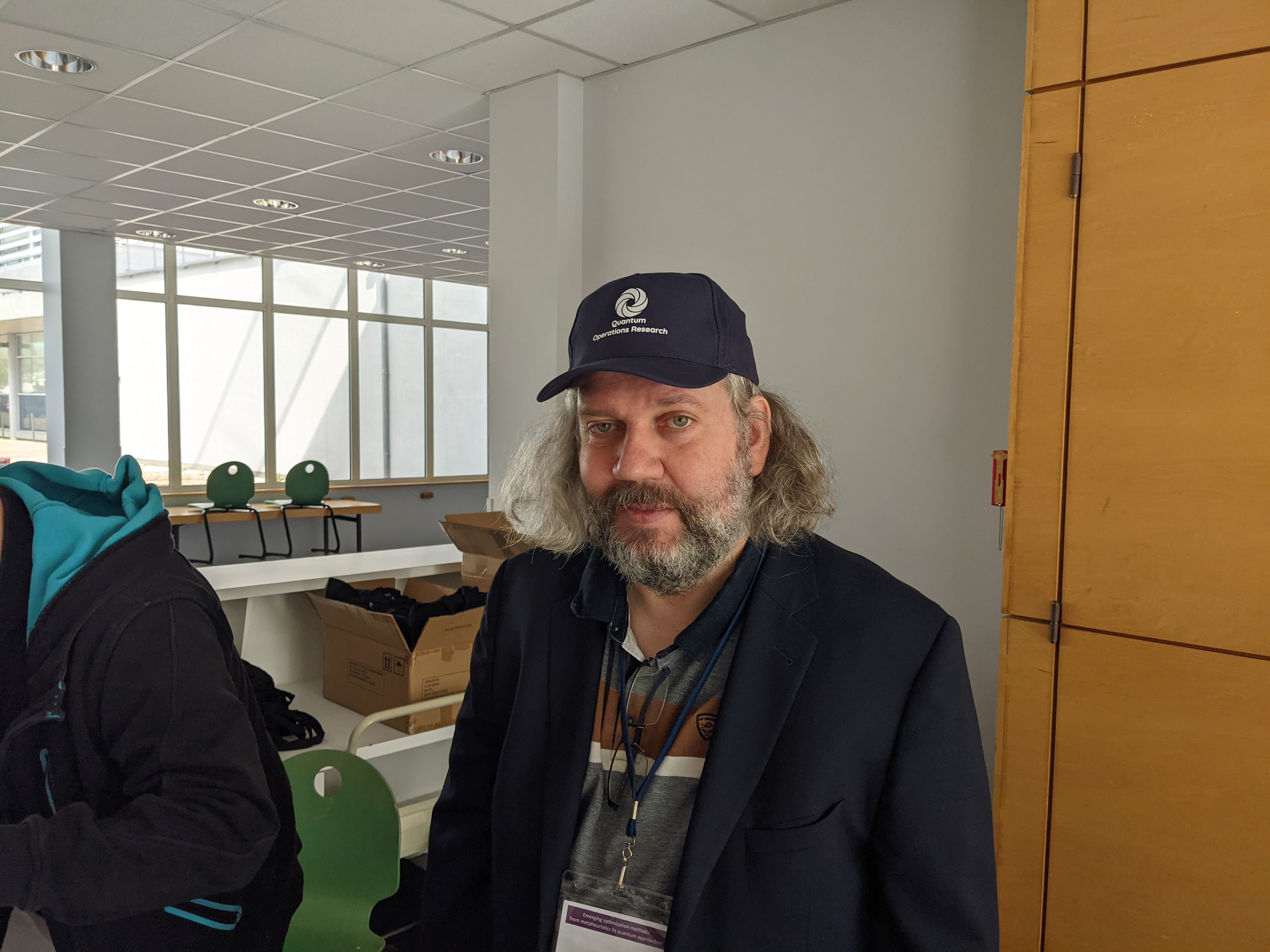
Eric Bourreau with a beautiful quantum cap 
Registration is open (thanks to Loic Yon to provide us help and support) 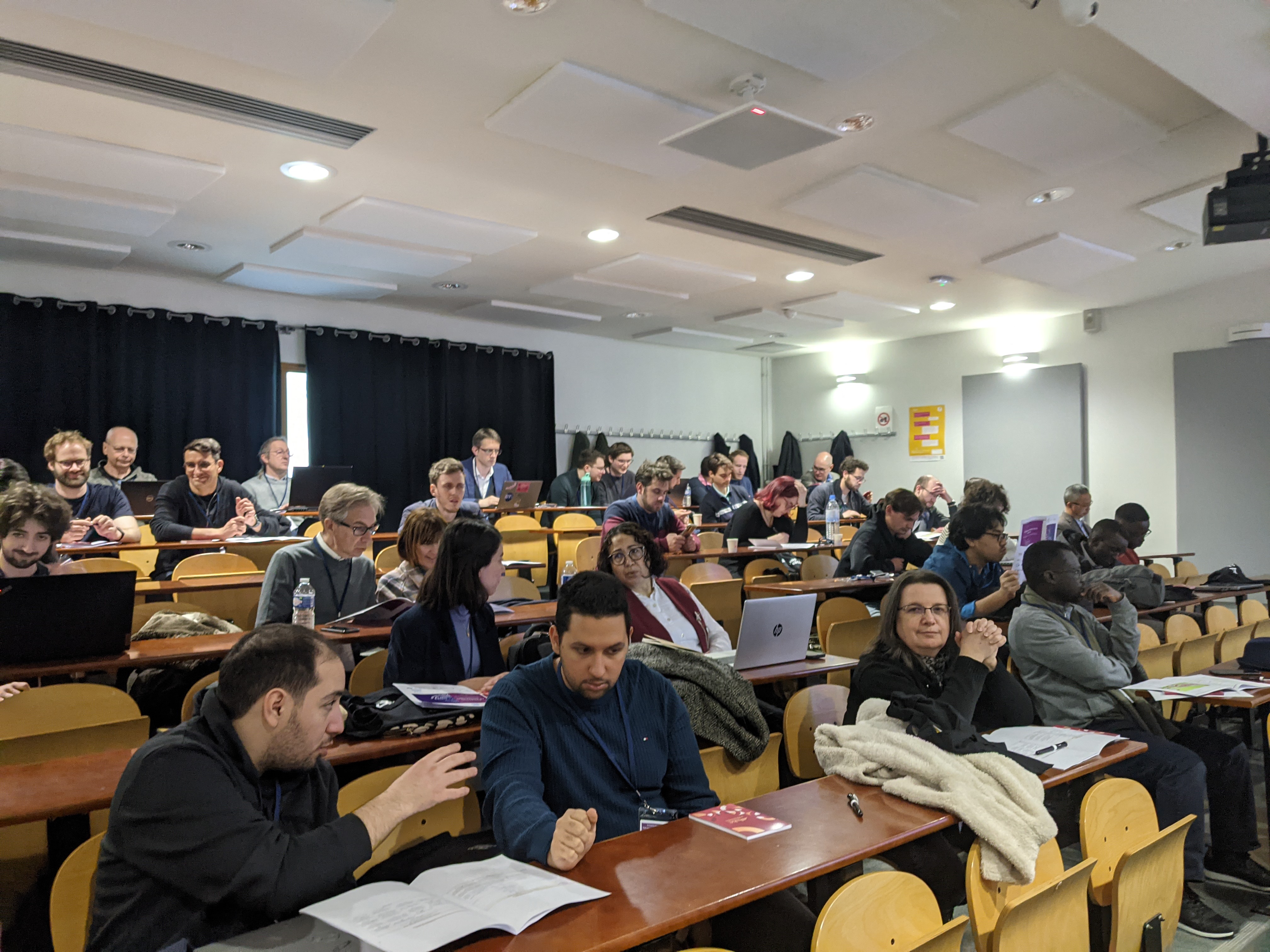
The participants 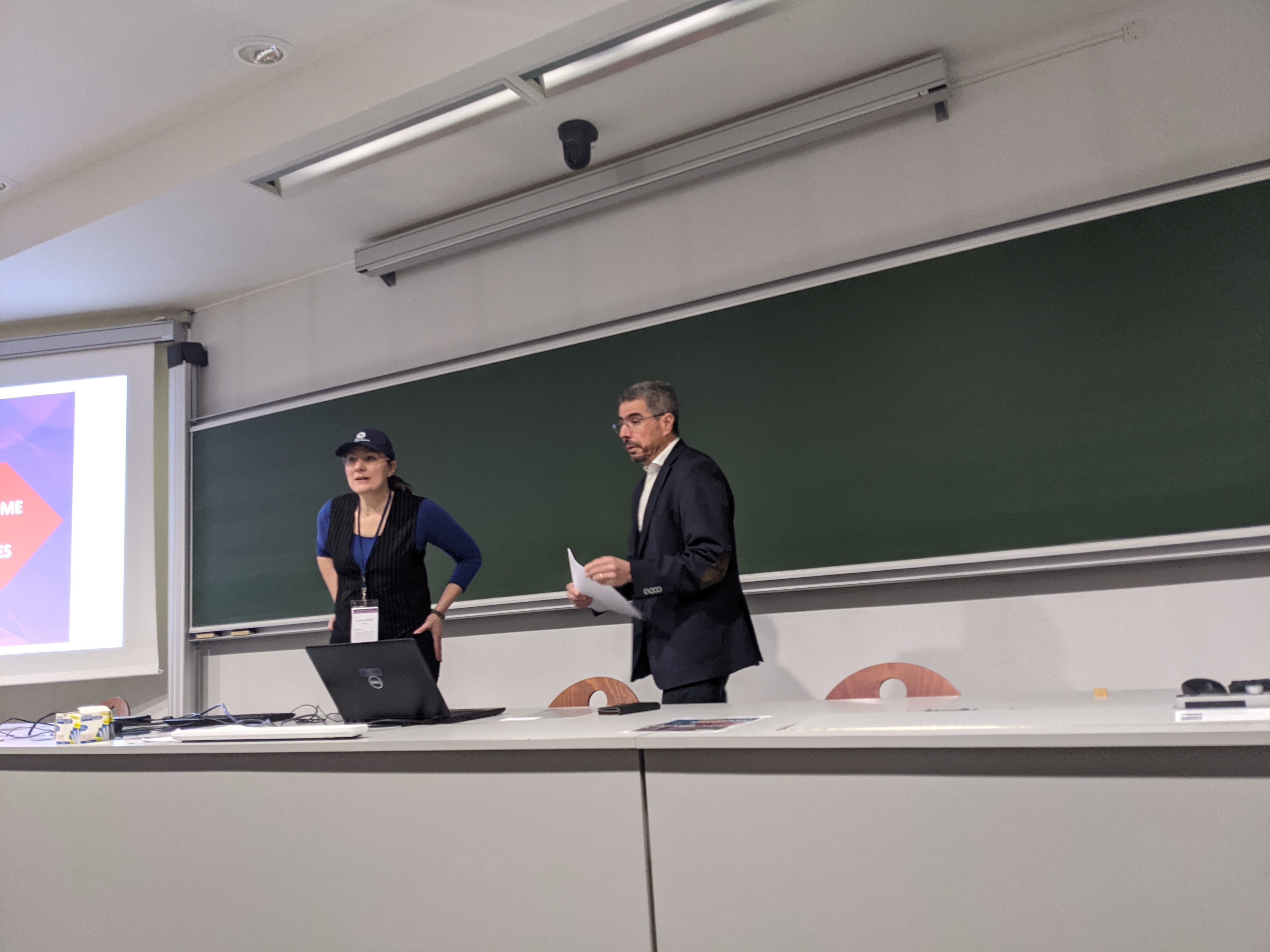
Wellcome speech by F. Yalaoui 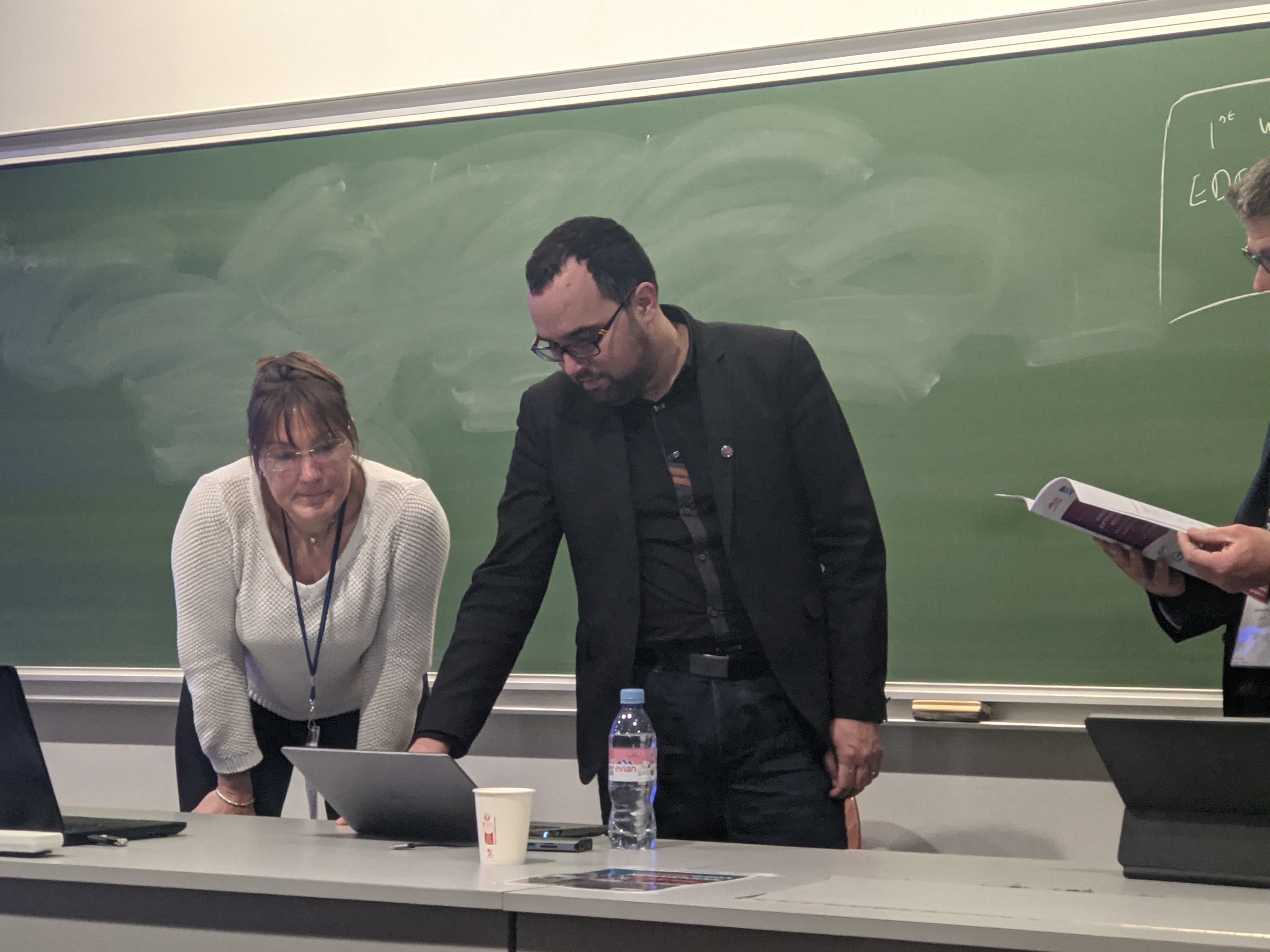
Neil Abroug who is at the Head of the French National Quantum Strategy 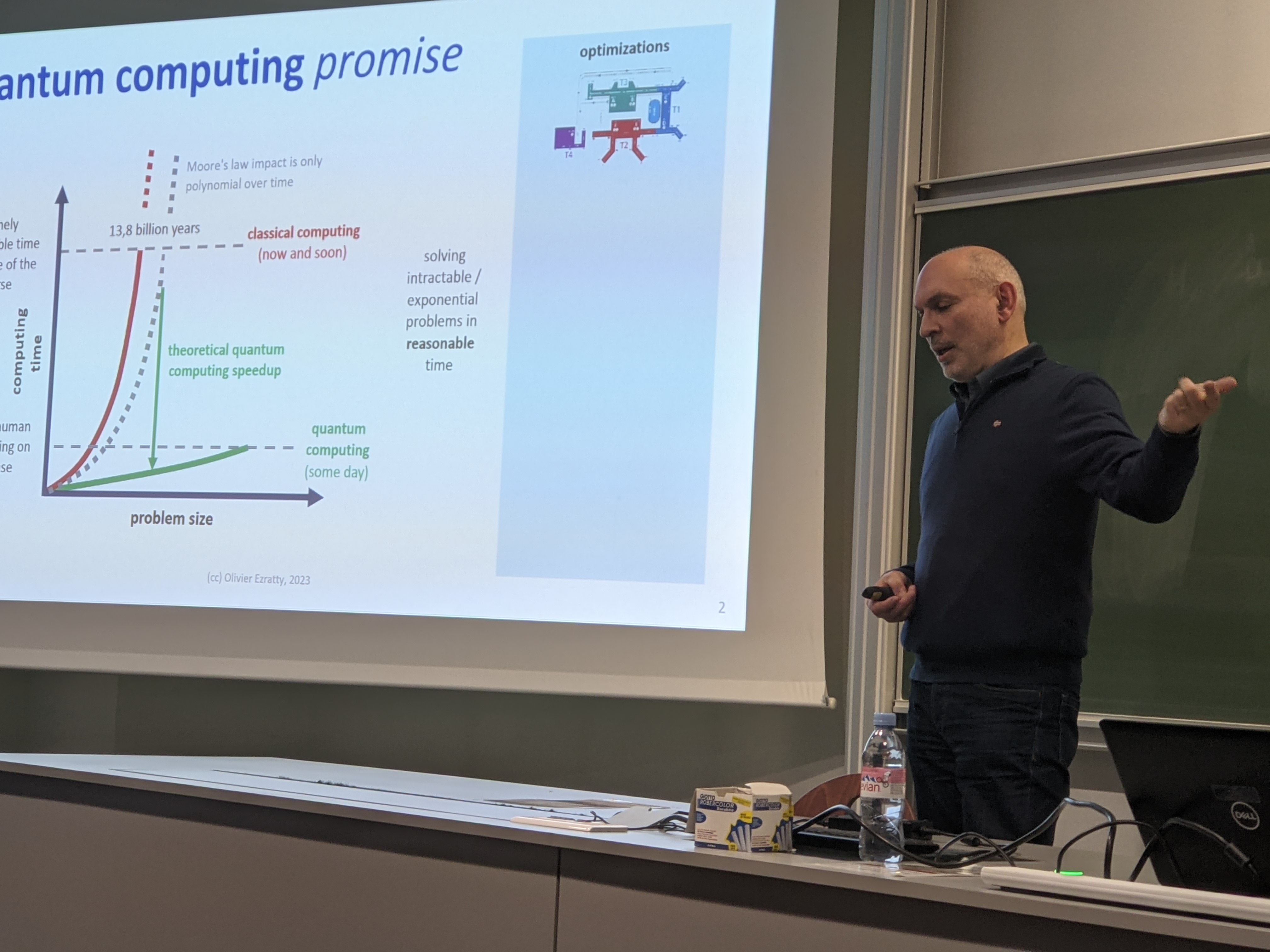
Olivier_Ezratty who gave us a global vision of the quantum environment 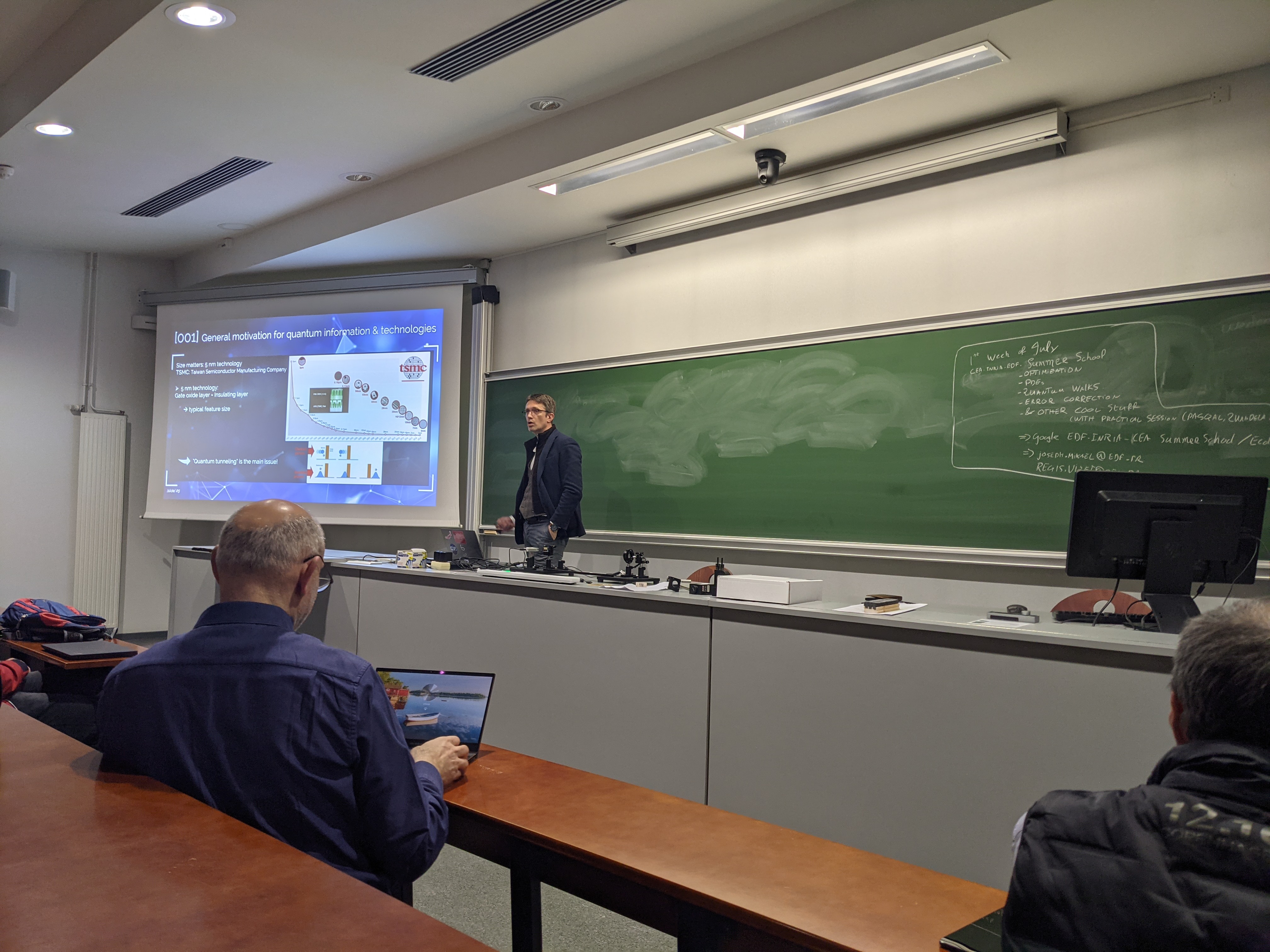
Christophe Couteau (UTT) 
Christophe Couteau (UTT) 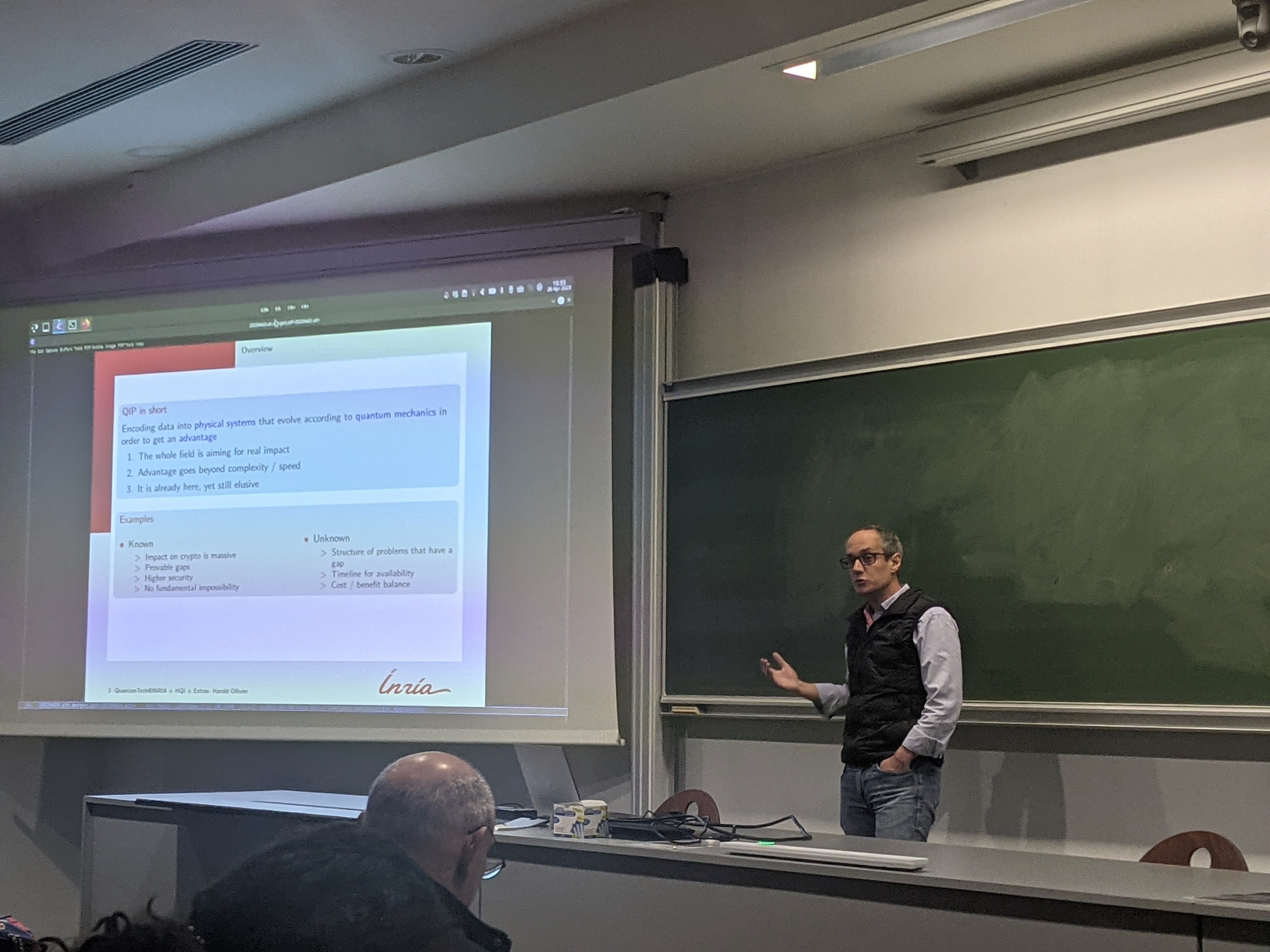
Harold Ollivier (INRIA) 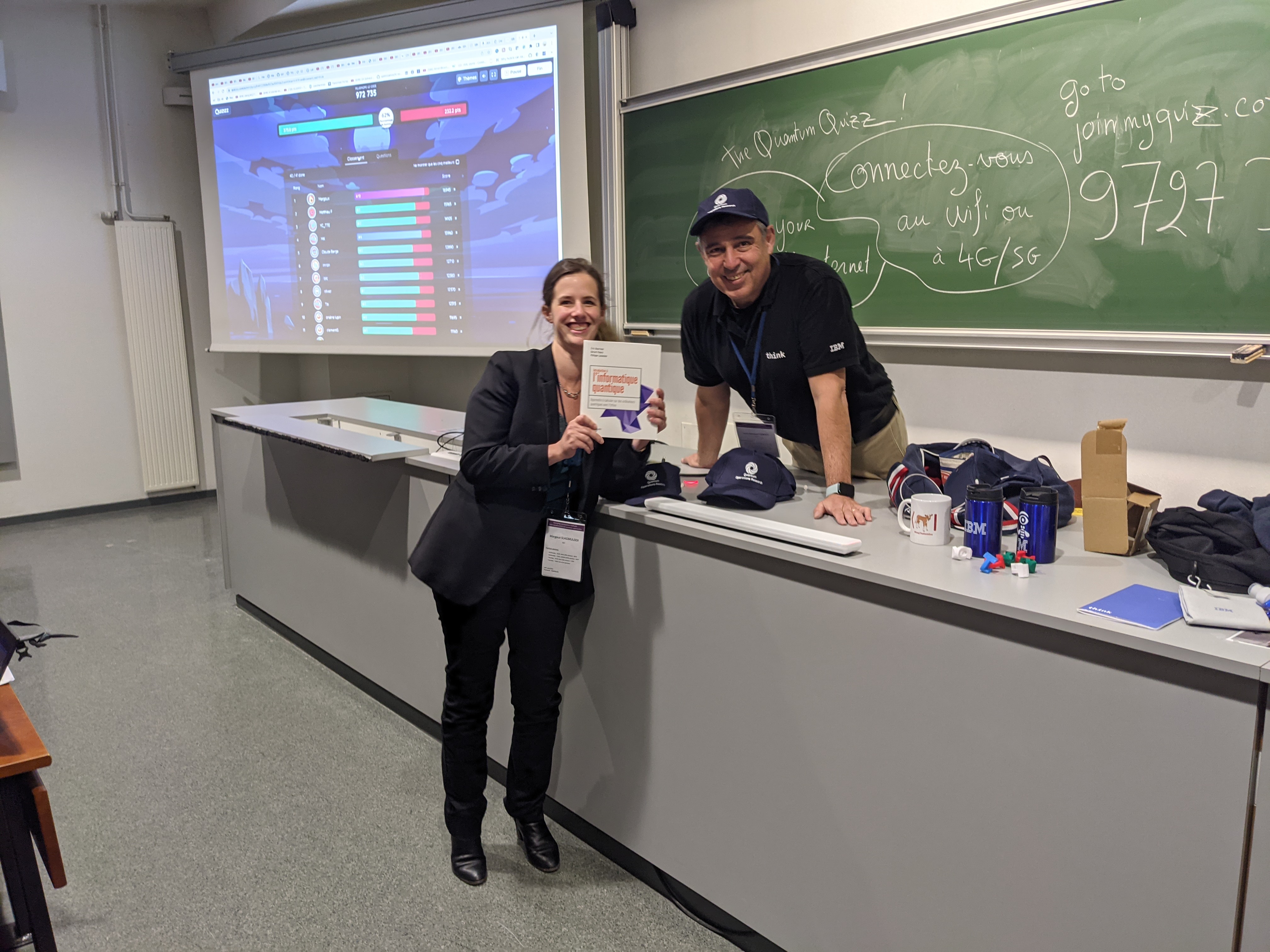
Margaux_Slagmulder - First price of the quizz organized by Jean-Michel Torres 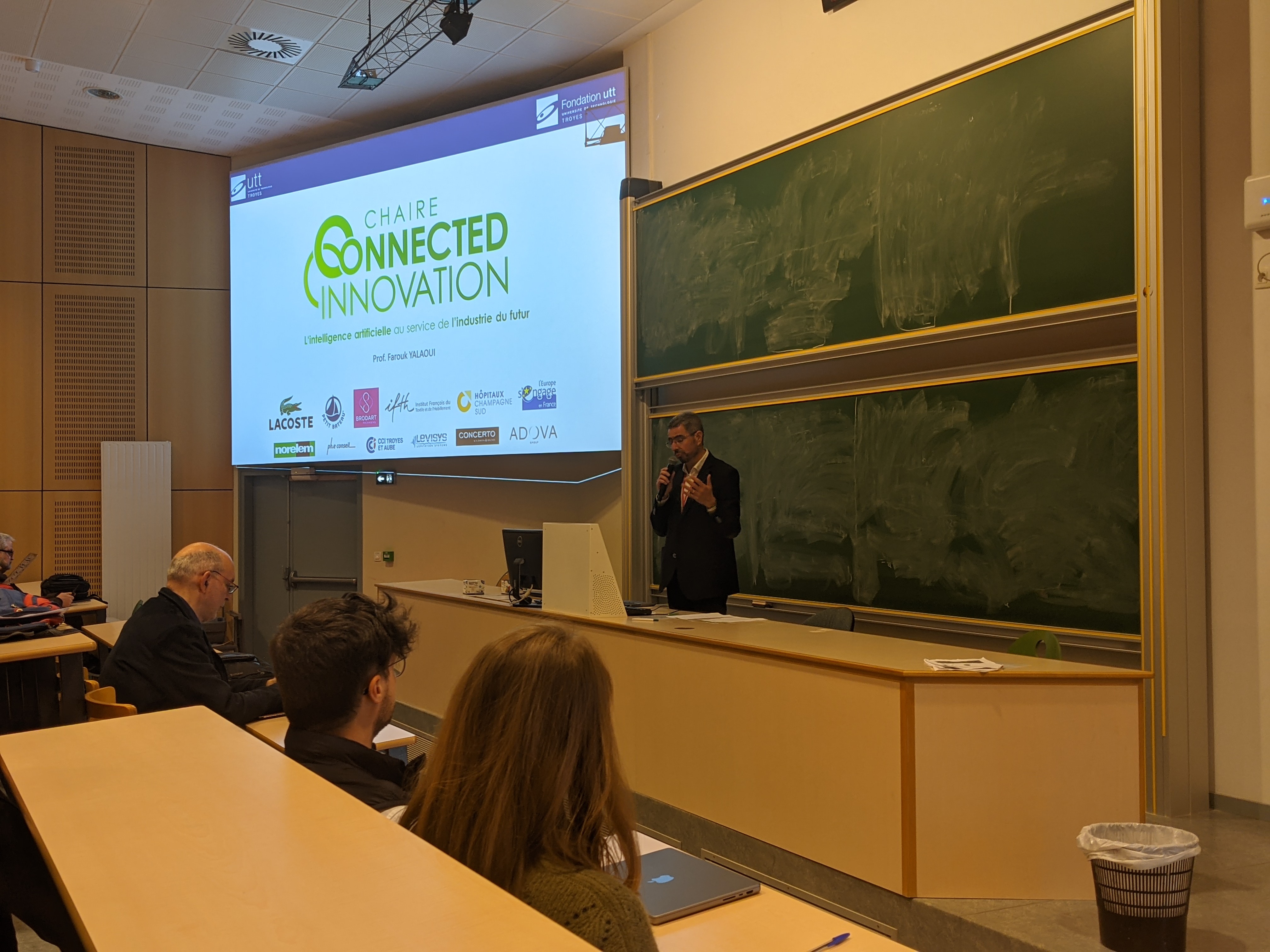
Part dedidcated to the Chaire Connected Innovation 
Dunjko Vedran 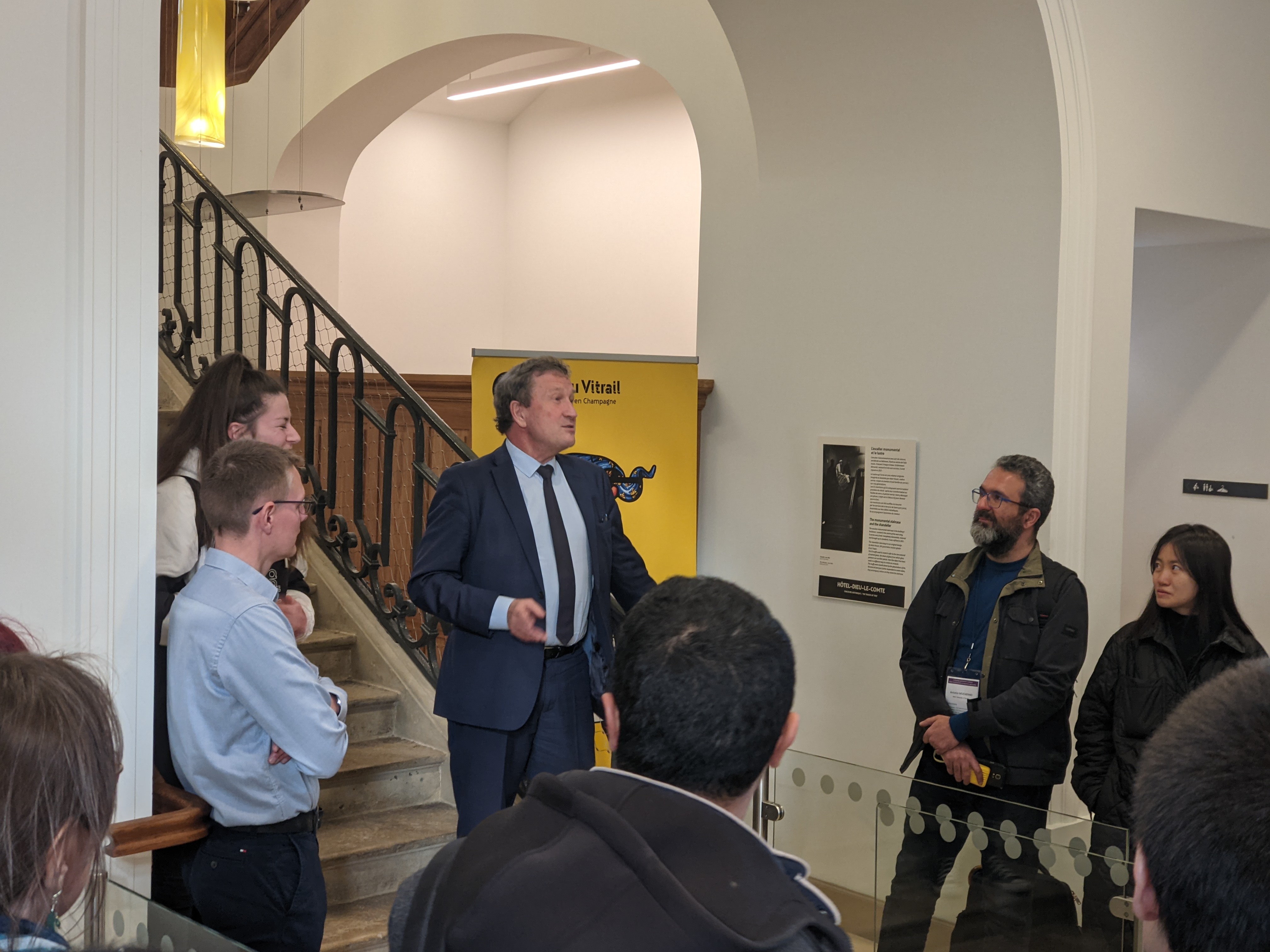
Philippe Pichery invited us to the city of stained glass L'ecole sur la RO Quantique − GT2L/GTIQ © 2021Nb. de visiteurs : 150 -
• Neil Abroug
-
• Caroline Prodhon
-
